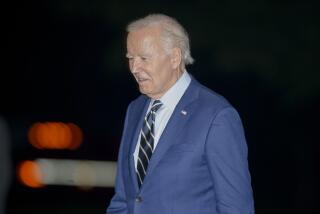Ready to Cooperate on Iran Arms Probe, Israelis Say
JERUSALEM — Israeli officials said Thursday that they have not been approached for information by American investigators looking into the controversial arms-to-Iran program, although they stand ready to cooperate under appropriate circumstances.
These sources made clear, however, that Israel is not anxious to put itself in the middle of what it sees as a politically explosive, internal American problem, and therefore will not volunteer any detailed knowledge it possesses about the affair.
“If they want to hear details from us, they will approach us,” one senior official commented. Barring that, he added, “the policy here in the next few days will be to keep a low profile.”
While Israeli leaders have publicly denied any knowledge of money from Iranian arms sales being diverted to the Nicaraguan rebels, known as contras , they did finally confirm earlier this week that Israel helped transfer “defensive arms and spare parts from the United States to Iran at the request of the United States.”
Arranged Contacts
Israel is said to have transmitted to the Reagan Administration in the summer of 1985 information that Iranian officials were interested in re-establishing contacts and that in return for supplies of badly needed American arms and replacement parts, they were ready to arrange for the release of U.S. hostages held by pro-Iranian elements in Lebanon.
Israelis were also instrumental in arranging contacts and actually running the arms pipeline.
While it is uncertain how much information officials here could supply to congressional and Justice Department investigations into the Iranian arms affair, there are some mysteries on which they clearly could shed light.
U.S. Atty. Gen. Edwin Meese III said Tuesday, for example, that Israel had no prior authorization for an initial shipment of arms to Iran in August or September, 1985. Israel insists that it sent no arms without explicit Reagan Administration approval, but officials here have refused media requests for details.
No Profit on Deal
Foreign Minister Shimon Peres, who was prime minister at the time the Iranian arms operation began, insisted in a Knesset (Parliament) speech Wednesday that Israel “did not earn one red cent” from it, and that whatever Iran paid for the weapons went directly into a Swiss bank account.
However, officials here have refused to publicly discuss how and by whom that bank account was set up, and how the price of the transferred weapons was determined. Meese said that Washington shipped $12 million worth of arms to Iran under the program but that the Iranians paid as much as $30 million more than that.
Whatever information Israel possesses could become more important in the wake of a Los Angeles Times report Thursday that a former National Security Council official, Lt. Col. Oliver L. North, had shredded files about the operation last weekend.
North, who played a key role in the Iran operation in his post as the NSC’s deputy director for political-military affairs, was fired earlier this week. It is believed that some of the shredded documents might have shed light on whether other Administration officials, beyond those already implicated in the affair, may have been aware of what was going on.
No Need for Decision
One Israeli official who requested anonymity said that there have been “preliminary discussions” here about the possibility of a U.S. request for cooperation in the various Iranian arms inquiries. No decisions were taken, this official said, because “there is no need to make a decision.”
However, this official added: “I’m sure Israel would cooperate. There’s no reason for it not to cooperate.”
A second official said Israel’s response would depend “on the nature of the request and what they want to ask; it depends whom do they want to interview, where, and all these circumstances which are, right now, hypothetical.”
But a third recalled the precedent of the Jonathan Jay Pollard case earlier this year, when Israel allowed American officials to come here and interview Israeli intelligence operatives. Pollard, a former U.S. Navy intelligence analyst, was arrested a year ago and convicted in June of spying for Israel.
2 Israelis Involved
The Israeli official who cited the precedent specifically mentioned two Israelis involved in the Iranian arms operation and said he believes the government would cooperate if the United States wanted to question them. The two are David Kimche, former director general of the Foreign Ministry, and Amiram Nir, adviser on terrorism to Peres when he was prime minister and to the present prime minister, Yitzhak Shamir.
Kimche was reportedly the official who approached the Reagan Administration about a possible Iranian deal on Peres’ instructions in 1985. Nir took over responsibility for Israel’s end of the program late in 1985 and continued in that role until the operation was revealed early this month.
Neither Kimche nor Nir could be reached for comment.
Meanwhile, government officials say there is no Israeli investigation into the Iranian affair despite questions concerning the murky role in it played by Israeli arms dealers. “Up to now there is no need for that,” one official said.
More to Read
Sign up for Essential California
The most important California stories and recommendations in your inbox every morning.
You may occasionally receive promotional content from the Los Angeles Times.









